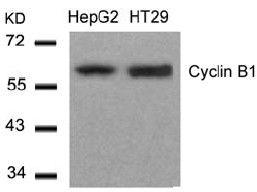Cyclin B1 (CCNB1) Rabbit Polyclonal Antibody
Other products for "CCNB1"
Specifications
| Product Data | |
| Applications | IF, IHC, WB |
| Recommended Dilution | Immunohistochemistry on Paraffin Sections: 1/50-1/100. Immunofluorescence: 1/100-1/200. Western Blot: 1/500-1/1000. |
| Reactivities | Human |
| Host | Rabbit |
| Clonality | Polyclonal |
| Immunogen | Peptide sequence around aa.145~149 (A-F-S-D-V) derived from Human Cyclin B1 |
| Specificity | This Antibody detects endogenous levels of total Cyclin B1 protein. |
| Formulation | PBS (without Mg2+ and Ca2+), pH 7.4, 150mM NaCl, 0.02% Sodium Azide and 50% Glycerol State: Aff - Purified State: Liquid purified Ig fraction |
| Concentration | 1.0 mg/ml |
| Purification | Affinity Chromatography using epitope-specific peptide |
| Predicted Protein Size | 60 kDa |
| Gene Name | Homo sapiens cyclin B1 (CCNB1) |
| Database Link | |
| Background | In mammals, cyclin B associates with inactive p34 cdc2 which facilitates phosphorylation of p34 cdc2 at amino acids 14 Thr and 15 Tyr. This maintains the inactive state until the end of G2 phase. The inactive cyclin B p34 cdc2 complex continues to accumulate in the cytoplasm until the completion of DNA synthesis, when Cdc25, a specific protein phosphatase, dephosphorylates amino acids 14Thr and 15Tyr of p34 cdc2, rendering the complex active at the G2 / M boundary. This mitotic kinase complex remains active until the metaphase / anaphase transition when cyclin B is degraded. This degradation process is ubiquitin dependent and is necessary for the cell to exit mitosis. Therefore, cyclin B p34 cdc2 plays a critical role in G2 to M transition. Two alternative transcripts have been found, a constitutively expressed transcript, and a cell cycle-regulated transcript that is expressed predominantly during G2/M phase. The different transcripts result from the use of alternate transcription initiation sites. |
| Synonyms | CCNB1, CCNB, Cyclin-B1 |
| Reference Data | |
| Protein Families | Druggable Genome, Stem cell - Pluripotency |
| Protein Pathways | Cell cycle, Oocyte meiosis, p53 signaling pathway, Progesterone-mediated oocyte maturation |
Documents
| Product Manuals |
| FAQs |
| SDS |
{0} Product Review(s)
0 Product Review(s)
Submit review
Be the first one to submit a review
Product Citations
*Delivery time may vary from web posted schedule. Occasional delays may occur due to unforeseen
complexities in the preparation of your product. International customers may expect an additional 1-2 weeks
in shipping.






























































































































































































































































 Germany
Germany
 Japan
Japan
 United Kingdom
United Kingdom
 China
China





